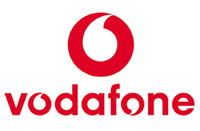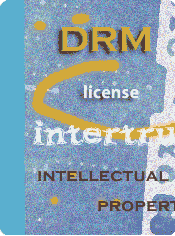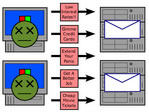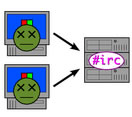 This weekend, there’s been lots of furious chat on blogs and Slashdot about the EULA that comes with SonyBMG’s audio CDs.
This weekend, there’s been lots of furious chat on blogs and Slashdot about the EULA that comes with SonyBMG’s audio CDs.
An EULA? What’s that? I hear you cry. An End User Licensing Agreement (EULA) is something that has been shipping with software packages for a very long time – the cold-hearted view of them is they impose restrictions on the purchaser while absolving its producers from any liability.
To have an agreement shipping with an _audio CD_ in itself is pretty strange. The EULA may well be related to the software that is shipped on the protected CDs, not the music – but this is now unimportant as the generally held view is that it is for the music.
It certainly has got the goal of a few – but it’s the terms of this 3,000 word EULA that has most up in arms. Some of the highlights/lowlights of it are
- If you move out of the country, you have to delete all your music. The EULA specifically forbids “export” outside the country where you reside.
- If you file for bankruptcy, you have to delete all the music on your computer. Seriously.
- You can’t keep your music on any computers at work. The EULA only gives you the right to put copies on a “personal home computer system owned by you.”
The full list is detailed on the EFF site.
All of this builds up on the now huge story of SonyBMG’s choice of software on some of their US released audio CDs. Called XCP, originally designed to ‘assert’ SonyBMG’s rights over their music CD’s, it installs itself on any computer where the audio CD is played. The user of the disk isn’t asked if this is OK, or even told that the software is installing itself. The software then hides itself using something called “rootkit.”
The really big problem for SonyBMG is that virus writers are now using this rootkit exploit to deliverer their viruses.
 Many have reacted to RootKit by saying that they feel it is ‘safer’ for them to download their music from unlicensed file sharing services, as they aren’t exposing themselves to unauthorised pieces of software installing on their machines.
Many have reacted to RootKit by saying that they feel it is ‘safer’ for them to download their music from unlicensed file sharing services, as they aren’t exposing themselves to unauthorised pieces of software installing on their machines.
SonyBMG have said they will stop selling music CD’s using XCP, but the damage to the Sony name has been done.
It’s all going wrong
A while back Sony, the parent company, had a revelation – that they needed to look outside their Sony Silo and start of embrace open formats. We saw MP3 being supported on their music players, where they’d always insisted on using their propriety content protections scheme ATRAC3. I even saw DivX supported on their DVD players, where DivX had previous been thought of as the content pirates tool.
Sony had (I stress had) started to claw back against Apple and the other companies that they’d been losing out to. As of now, it looks like they’ve slipped even further behind. For goodness sakes, they’ve even got groups of people suggesting Boycott Sony and 3488 have, so far, signed an anti-Sony petition.
Sadly for Sony, it doesn’t end there
In digging through SonyBMG’s code, Finn Matti Nikki has located references to LAME, an open source, MP3 encoder library, within the code used by SonyBMG’s version of the XCP software.
As Matti says, “I’d say this indicates that the executable has been compiled against static LAME library, which happens to be LGPL. I don’t have any further evidence about this, other than lots of data from libmp3lame being included and easy to find.” Let us translate – the LGPL (Lesser General Public License) provides certain freedoms and restrictions in the use of the software covered by it.
These include needing to make the source code to the open-source libraries available and the source code and executable code of their programs.
Without abiding by these rules, they are breaking the licensing terms of the content. Carrying out the exact act they the music companies are loudly decrying in their customer.
Where now for Sony? SonyBMG have managed to completely undo the small, patient steps that Sony, the hardware business, has been taking to gathering favour with the equipment buying public.
SonyBMG have managed to completely undo the small, patient steps that Sony, the hardware business, has been taking to gathering favour with the equipment buying public.
The idea of Sony owning content and hardware businesses always appears to be a great idea – they’d win all around. The reality is turning out to be very different.
There is a tension between the content business, who want to restrict movement of content, and the hardware business that wants to set the purchaser free. Whether a comfortable balance between these can ever be struck is unclear.
What is clear is that it appears that this CD story is nearly out of control for Sony. Someone at the most senior level at Sony needs to grab hold of this and do something radical. Our suggestion for a surefire, credibiliy-straightening maneuver? Reject DRM.
LGLP
SonyBMG on XCP
Wikipedia on LAME
LAME
Slashdot – Sony’s EULA Worse Than Its Rootkit?
 Oooh, Conspiracies Abound
Oooh, Conspiracies Abound From December 1, all iTunes downloads will carry a new kind of Fair Play DRM, a direct negative feedback ‘watermark’ recognized by Fair Play earbuds and, ultimately, by other audio devices from manufacturers who sign up for the code, which was created under a joint SunnComm and Macrovision venture.
From December 1, all iTunes downloads will carry a new kind of Fair Play DRM, a direct negative feedback ‘watermark’ recognized by Fair Play earbuds and, ultimately, by other audio devices from manufacturers who sign up for the code, which was created under a joint SunnComm and Macrovision venture. Intertrust must have though that all of the xmases came at once on the day Vodafone confirmed their licensing deal. It’s not every day that the World’s largest mobile operator signs a deal like that with you.
Intertrust must have though that all of the xmases came at once on the day Vodafone confirmed their licensing deal. It’s not every day that the World’s largest mobile operator signs a deal like that with you. The Vodafone deal goes well beyond these basics and licenses all of the technologies and patent that Intertrust have available.
The Vodafone deal goes well beyond these basics and licenses all of the technologies and patent that Intertrust have available. Both Vodafone and Intertrust declined to reveal the value of the transaction, but given the need for separate deals with the handset companies, it may be here that Intertrust make most of their money. This will not be optional if the handset manufacturers want to be on the Vodafone service and offer content.
Both Vodafone and Intertrust declined to reveal the value of the transaction, but given the need for separate deals with the handset companies, it may be here that Intertrust make most of their money. This will not be optional if the handset manufacturers want to be on the Vodafone service and offer content. Ofcom, the UK uber-regulator, has today announced that they have removed the licensing restrictions on the frequency that radio frequency identification(RFID) tags use.
Ofcom, the UK uber-regulator, has today announced that they have removed the licensing restrictions on the frequency that radio frequency identification(RFID) tags use. The commercial rivalry between two UK online retailers has spilt over into the world of advertising, or more precisely the heady world of UK advertising adjudication, run by the Advertising Standards Authority.
The commercial rivalry between two UK online retailers has spilt over into the world of advertising, or more precisely the heady world of UK advertising adjudication, run by the Advertising Standards Authority. The ASA batted the first complaint aside, but felt the second held water despite Tesco putting up the follow argument. Their long winded thinking can be cut down to … As no single CD or DVD was priced over £19 (thank goodness – our addition), to qualify for the Amazon free delivery, it entailed ordering more than one item.
The ASA batted the first complaint aside, but felt the second held water despite Tesco putting up the follow argument. Their long winded thinking can be cut down to … As no single CD or DVD was priced over £19 (thank goodness – our addition), to qualify for the Amazon free delivery, it entailed ordering more than one item. But this jiggery pokery didn’t get them off the hook and the ASA found against them.
But this jiggery pokery didn’t get them off the hook and the ASA found against them. Grokster, the online music sharing service, much legally embattled, has decided to shut the service and pay $50 million to settle claims against it.
Grokster, the online music sharing service, much legally embattled, has decided to shut the service and pay $50 million to settle claims against it. There is a plan to launch a service that they say will be a “safe and legal service” under the name Grokster 3G.
There is a plan to launch a service that they say will be a “safe and legal service” under the name Grokster 3G. Partially arguing against the UK ban on advertising by organisations that attempt to “influence public opinion on a matter of controversy”, she says her group will challenge the ban. Allen is right in some respects when she says:
Partially arguing against the UK ban on advertising by organisations that attempt to “influence public opinion on a matter of controversy”, she says her group will challenge the ban. Allen is right in some respects when she says: The alleged ‘commander’ of a 400,000 strong botnet has been arrested in the US, in the first US case brought.
The alleged ‘commander’ of a 400,000 strong botnet has been arrested in the US, in the first US case brought. He looks like he’s in pretty big trouble as he’s been charged with 17 counts, including conspiracy, transmission of code to a protected computer, to a government computer, and multiple counts of fraud and money laundering.
He looks like he’s in pretty big trouble as he’s been charged with 17 counts, including conspiracy, transmission of code to a protected computer, to a government computer, and multiple counts of fraud and money laundering. Among the computers infected were some from the Weapons Division of the US Naval Air Warfare Center, and machines belonging to the US Department of Defense’s Defense Information Systems Agency, according to a statement from Debra Wong Yang, US Attorney for the Central District of California.
Among the computers infected were some from the Weapons Division of the US Naval Air Warfare Center, and machines belonging to the US Department of Defense’s Defense Information Systems Agency, according to a statement from Debra Wong Yang, US Attorney for the Central District of California. This morning, Homechoice, the currently London-focused DSL-based VOD announced that they had appointed CSFB (Credit Suisse First Boston, as was) to raise new capital for their expansion around the UK.
This morning, Homechoice, the currently London-focused DSL-based VOD announced that they had appointed CSFB (Credit Suisse First Boston, as was) to raise new capital for their expansion around the UK. Their newly-announced ARPU (Average Revenue Per User) figures are impressive at £430, being considerably higher than Sky’s £384 (announced in 3 August 2005), but lower than Telewest’s £538 and ntl’s £477 (reported to ofcom, Q2 2005).
Their newly-announced ARPU (Average Revenue Per User) figures are impressive at £430, being considerably higher than Sky’s £384 (announced in 3 August 2005), but lower than Telewest’s £538 and ntl’s £477 (reported to ofcom, Q2 2005). MacExpo has moved to Olympia from the Islington Design Centre and that’s probably the most exciting bit of the show.
MacExpo has moved to Olympia from the Islington Design Centre and that’s probably the most exciting bit of the show. The new G5’s are nice, based on the PCI Express architecture with the ability to put some very high-end NVidia graphics to real work. They now support two CPU’s each with dual cores (i.e. 4 cores) though each core only operates up to 2.5GHz rather than the older two CPU systems that operate up to 2.7GHz (but then, in theory, you’re getting 10GHz compared to a max previously of 3.4GHz – real world tests show more like a 67% speed increase). The new NVidia graphics cards are all capable of driving dual displays – so that’s two 30″ Cinema displays … but you’ll need a new desk.
The new G5’s are nice, based on the PCI Express architecture with the ability to put some very high-end NVidia graphics to real work. They now support two CPU’s each with dual cores (i.e. 4 cores) though each core only operates up to 2.5GHz rather than the older two CPU systems that operate up to 2.7GHz (but then, in theory, you’re getting 10GHz compared to a max previously of 3.4GHz – real world tests show more like a 67% speed increase). The new NVidia graphics cards are all capable of driving dual displays – so that’s two 30″ Cinema displays … but you’ll need a new desk. The new iMacs were there too and they are still the sexiest systems on the market.
The new iMacs were there too and they are still the sexiest systems on the market.